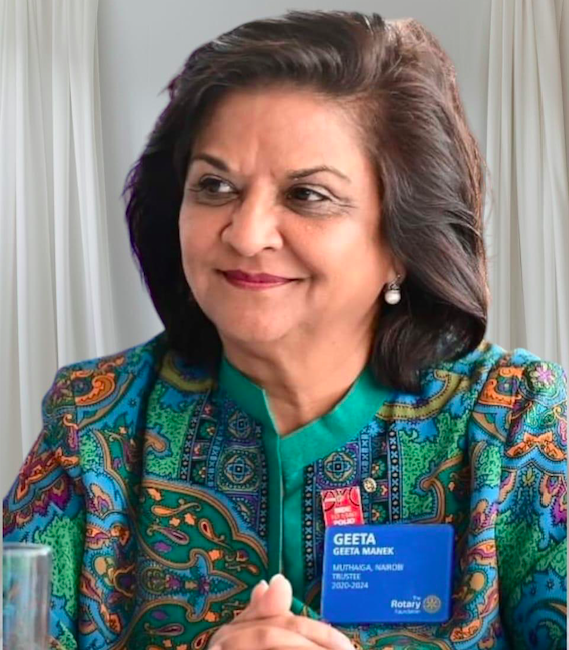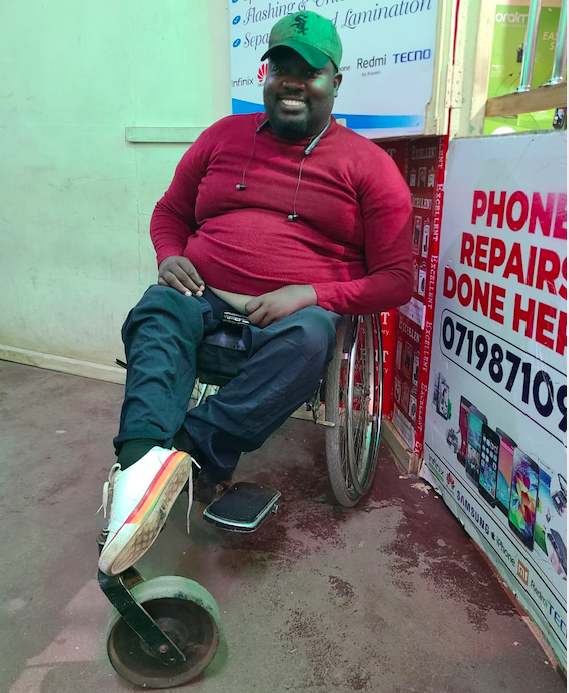 Rotary
International Trustee Dr. Greeta Manek: "We are committed to
global advocacy because a single case of polio anywhere in the world means the
virus is just a plane ride away—posing a threat to everyone, everywhere."
Rotary
International Trustee Dr. Greeta Manek: "We are committed to
global advocacy because a single case of polio anywhere in the world means the
virus is just a plane ride away—posing a threat to everyone, everywhere."Abdalla
Ndalukaria was diagnosed with Polio in 1987, a year after his birth, robbing
him of a chance to enjoy his childhood playing with his peers.
When he didn't crawl or try to stand using furniture in the house when he was a few months shy of his first birthday, this delayed milestone worried his mother, and a few hospital visits later, she was informed that her son had a paralyzing disease, polio.
The virus left his legs paralyzed, and his early years were filled with struggle as he sat and watched his peers enjoy the games. Decades later, Ndalukaria turned every obstacle into motivation becoming a symbol of resilience in Machakos County committed to ensuring that no child is left behind. As a polio champion, he is dedicated to providing information on the benefits of the polio vaccine to all parents and guardians to ensure that every child gets the life-saving vaccine.
As a polio champion, Ndalukaria participates in health awareness campaigns to reach out to every parent and guardian, tracing back to conversations with his mother about the life-saving role of vaccines.
"My mother was devastated that I had missed some vaccines, including the Polio one. The health worker informed her that the polio vaccine given in the first year of my life could have prevented the infection that led to the paralysis," Ndalukaria said.
Ndalukaria was enrolled in a series of treatments and physiotherapy to strengthen some of the weak muscles that later proved beneficial in strengthening his limbs for walks using crutches. He describes his early childhood as a combination of delayed milestones, stolen dreams, missed chances, and an unending race to play catch-up with his peers.
“My entire life has felt like a race—battling stigma, catching up on opportunities like going to school, proving my abilities during job interviews, and even facing social challenges like dating. But in the end, I won—I became a polio champion and convinced a beautiful woman to become my wife,” he said with a smile. He added that his resilience, determination, and unwavering family support were key to his journey toward inclusion and success.
According to Ndalukaria, both his studies were significantly affected during treatment, and socially, he faced trauma and stigma from the ridicule, taunting, and avoidance from his peers who refused to play with him.
As Kenya joins the rest of the continent and the world to mark the week-long World Immunization Week 24 to 30 April, governments have been challenged to set up resilient health systems that serve as investments rather than expenditures.
This year's theme, ' Immunization for All is Humanly Possible,' focuses on a World Health Organization clarion call on the immunization gains in the coming decades as more children receive the essential immunizations and more vaccines are developed to cover a broader range of childhood diseases.
The World Health Organization defines polio as a highly infectious viral disease that primarily affects children under five years of age. The virus is transmitted by person-to-person and spreads mainly through the foecal-oral route or, less frequently, by a standard vehicle such as contaminated water or food. It multiplies in the intestine, from where it can invade the nervous system and cause paralysis.
 Abdalla
Ndalukaria, who was diagnosed with Polio in 1987, a year after his birth.
Abdalla
Ndalukaria, who was diagnosed with Polio in 1987, a year after his birth.In 1988, the World Health Assembly adopted a resolution for the worldwide eradication of Polio, marking the launch of the Global Polio Eradication Initiative, spearheaded by national governments, World Health Organisation, Rotary International, the US Centers for Disease Control and Prevention (CDC), UNICEF, and later joined by the Bill & Melinda Gates Foundation and Gavi, the Vaccine Alliance.
Rotary International Polio Plus District 9212 Coordinator Dr. Lucas Nyabero noted that robust healthcare systems require foresight and a different mentality than reliance on politics and policies that expire after a general election cycle.
Dr Nyabero noted that there have been positive outcomes secondary to government, donors, partners investments calling for more investments in areas such as maternal and child health citing programmes such as TB, HIV and malaria programmes funded by The Global Fund, USAID and PEPFAR.
“These investments have significantly reduced mother-to-child transmission of HIV. We must now find sustainable ways to ensure these hard-won gains are not lost.",” Dr Nyabero said. The Preventing Mother To Child Transmission program has several aspects that should be adopted by other healthcare programs. Among this aspects are, robust accurate data collection, a deliberately developed community, supportive peer ‘mentor-mothers, pays attention to patients’ needs, a well-designed referral system, all working in concert to make PMTCT successful.Dr. Nyabero noted that the impact of weak health systems is evident when elected leaders leave the elected and nominated posts, leaving the population spending more out-of-pocket on healthcare services or being underserved by the existing health facilities.
"We need leaders who look at whatever they put into healthcare, for instance, the vaccines, as an investment, not an expenditure, as it will bear fruits for longer than the term they will be supporting it. Expenditure is when they give us money, we go to GAVI and buy vaccines that we will use this year and next year, but how do we change that money to provide immunization for the next five years and extend it for the next 30 years," Dr. Nyabero said.
The African Vaccine Manufacturing Acceleration (AVMA) under GAVI is an innovative financing mechanism that provides a pathway to sustainability for African vaccine manufacturing while improving the region's resilience in the face of pandemics, outbreaks, and other health emergencies.
According to GAVI, AVMA will make up to USD 1 billion available to support vaccine manufacturing. According to Africa CDC, this is a game changer for the continent and advances efforts towards self-reliance, adding that this will ensure everyone in Africa receives the full benefits of immunization regardless of their background or location.
Africa CDC also states that AVMA will further accelerate the race to achieve the Partnerships for African Vaccine Manufacturing (PAVM) goal of producing 60 percent of vaccines in Africa by 2040.
According to Dr. Nyabero, the recent funding freeze by the US government, is a wake-up call for African governments to think beyond expenditure and find alternative and sustainable ways to domestically finance life-saving health initiatives such as child immunization programs. The World Health Organization estimates that more than three million lives a year, or six people every minute, have been saved for five decades through immunization.
Rotary International Trustee Dr. Greeta Manek, Trustee of the Rotary Foundation 2020-2024 notes that millions of children's lives have been saved under this partnership working with partners such as the WHO, UNICEF, The Gates Foundation, and Ministries of Health worldwide.
"We are committed to global advocacy because a single case of polio anywhere in the world means the virus is just a plane ride away—posing a threat to everyone, everywhere,” said Dr. Manek.
Dr Manek described the GPEI initiative as a promise to every child to finish the job of ending polio through the regular joint health campaigns in the Horn of Africa and globally working with governments and partners to ensure that every household is sensitized and every child is reached.
Rotary contributes USD 50 million annually, and each dollar it gives is usually doubled by the Gates Foundation (USD 100 million), making it USD 150 million. Dr. Manek further noted that Rotary International had made significant contributions towards polio awareness through volunteer time as Rotary Club and Rotaract members dedicatedly working in communities to create awareness of the benefits of the polio vaccine.
"Parents and guardians are informed about how just two drops of the polio vaccine—known locally as dawa—can protect their children. We also take time to address any concerns they may have. Our goal is to spare families the lifelong regret and stigma that can come from not vaccinating their children in time," said Dr Manek.
Ndalukaria found peace in solitary play outside the family home, under his mother's watchful and loving eye, where his friends could not ridicule him.
"If my mother knew the importance of vaccines, she would have taken me to the hospital to get immunized, and I would not have this physical disability today," says Ndalukaria.
Ndalukaria journey is a testament to how a difficult childhood can fuel the determination to overcome even the toughest beginnings—and how vaccines are more than just medicine; they are a promise of a healthier, more equitable future for every child.










